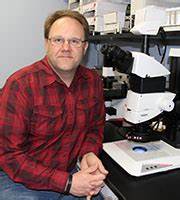
James M. Amos-Landgraf
Associate Professor of Veterinary Pathobiology
Veterinary Pathobiology,
amoslandgrafj@missouri.edu
(573) 882-1514
Research Emphasis: Our laboratory studies human colon cancer through the use of animal models. Using genetically engineered models of colon cancer in the mouse rat and pig, we are better able to understand the molecular genetic events that influence the initiation and progression of cancer. To help us understand human colon cancer development and discover potential chemotherapeutics we have pioneered the use of longitudinal in vivo monitoring. Through the use of classical and forward genetics we will discover new cancer susceptibility genes that will help identify potential human susceptibility genes for better diagnostics of human cancer risk. We have observed that the sex of the animal has as a profound impact on disease susceptibility, and that this is controlled by the present of testosterone. We are also investigating the role of the gut microbiota on the initiation and progression of colon cancer. By controlling the host genetics and altering the complex microbiome we are linking changes in the phenotype with changes in the epigenome. During our studies of genetic mechanisms of tumor initiation we discovered a novel epigenetic pathway leading early adenoma development. Understanding this epigenetic mechanism and the relationship to sex and the microbiome will lead to a better understanding of reversing or preventing disease.
Selected Publications:
Amos-Landgraf JM, Heijmans J, Wielenga MCB, Dunkin E, Krentz KJ, Clipson L, Ederveen AG, Groothuis PG, Mosselman S, Muncan V, homes DW, Shedlovsky A, Dove WF, van den Brink GR. Sex disparity in colonic adenomagenesis involves promotion by male hormones, not protection by female hormones. Proc Natl Acad Sci U S A. 111(46); 16514-9 (2014) PMC4246303
Irving AA, Yoshimi K, Hart ML, Parker T, Clipson L, Ford MR, Kuramoto T, Dove WF, Amos-Landgraf JM. The utility of Apc-mutant rats in modeling human colon cancer. Dis Model Mech. Nov;7(11):1215-25. (2014) PMC4213726
Dove WF, Shedlovsky A, Clipson L, Amos-Landgraf JM, Halberg RB, Krentz KJ, Boehm FJ, Newton MA, Adams DJ, Keane TM. A strategy to identify dominant point mutant modifiers of a quantitative trait. G3: Genes | Genomes | Genetics.. Apr 17;4(6):1113-21. (2014) PMC4065254
Irving AA, Young LB, Pleiman JK, Konrath MJ, Marzella B, Nonte M, Cacciatore J, Ford MR, Clipson L, Amos-Landgraf JM, Dove WF. A simple, quantitative method using alginate gel to determine rat colonic tumor volume in vivo. Comp Med. Apr;64(2):128-34.(2014) PMC3997291
Amos-Landgraf JM, Irving AA, Hartman C, Hunter A, Laube B, Chen X, Clipson L, Newton MA, Dove WF. 2012. Monoallelic silencing and haploinsufficiency in early murine intestinal neoplasms. Proc Natl Acad Sci U S A. 109 (6) 2060-2065 (2012) PMC3277532
Thliveris AT, Clipson L, Sommer L, Schoenike B, Hasenstein JR, Schlamp CL, Alexander CM, Newton MA, Dove WF, Amos-Landgraf JM. 2012. Regulated expression of chromobox homolog 5 revealed in tumors of ApcMin/+ ROSA11 gene trap mice. G3: Genes | Genomes | Genetics. May; 2: 569-578. (2012) PMC3362940
Irving AA, Halberg RB, Albrecht DM, Plum LA, Krentz KJ, Clipson L, Drinkwater N, Amos-Landgraf JM, Dove WF, DeLuca HF. 2011. Supplementation by vitamin D compounds does not affect colonic tumor development in vitamin D sufficient murine models. Arch Biochem Biophys. Nov; 515(1-2):64-71. (2011) PMC3295581
Church DM, Goodstadt L, Hillier LW, Zody MC, Goldstein S, She X, Bult CJ, Agarwala R, Cherry JL, DiCuccio M, Hlavina W, Kapustin Y, Meric P, Maglott D, Birtle Z, Marques AC, Graves T, Zhou S, Teague B, Potamousis K, Churas C, Place M, Herschleb J, Runnheim R, Forrest D, Amos-Landgraf J, Schwartz DC, Cheng Z, Lindblad-Toh K, Eichler EE, Ponting CP; Mouse Genome Sequencing Consortium. Lineage-specific biology revealed by a finished genome assembly of the mouse. PLoS Biol. May 5;7(5): (2009) PMCID: PMC2680341
Halberg RB, Chen X, Amos-Landgraf JM, White A, Rasmussen K, Clipson L, Pasch C, Sullivan R, Pitot HC, Dove WF. 2008. The pleiotropic phenotype of Apc mutations in the mouse: allele specificity and effects of the genetic background. Genetics. Sep;180(1):601-9. (2008) PMC2535708
Amos-Landgraf JM, Kwong LN, Kendziorski CM, Reichelderfer M, Torrealba J, Weichert J, Haag J, Chen KS, Waller JL, Gould MN, Dove WF. 2007. A target-selected Apc-mutant rat kindred enhances the modeling of familial human colon cancer. Proc Natl Acad Sci U S A 104:4036-41 (2007) PMC1805486
